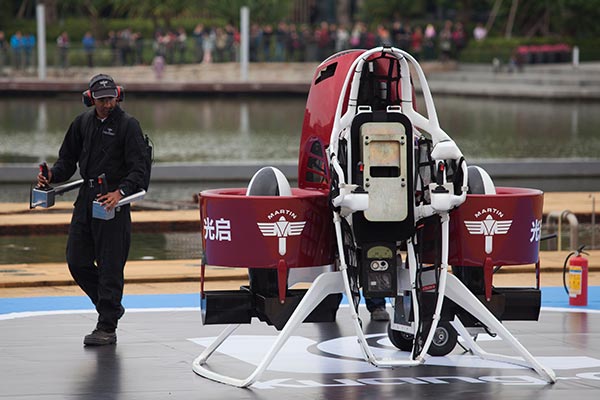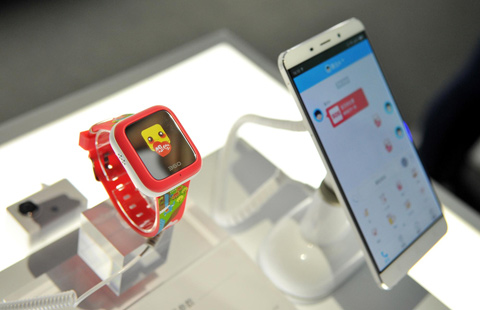Space-tech outfit on shopping spree
(China Daily) Updated: 2016-09-19 08:14
 |
|
A Martin Jetpack, the world's first practical and commercial jetpack, which is developed by KuangChi Science, an innovative high-tech startup in Shenzhen, Guangdong province.[Provided to China Daily] |
KuangChi, whose other projects include the Wearable Spiritual Armour exoskeleton, launched a $300 million fund in May to back startups working on cutting-edge computing, space-faring technology and communications. The fund's outlay may double because of the plethora of suitable companies that have since contacted the Hong Kong-listed company, Founder and Chairman Liu Ruopeng told Bloomberg News.
Liu's also hoping to develop technology to decipher human emotions. Last week, it announced a $3 million investment in Israel's Beyond Verbal Communication Ltd, which specializes in voice analytics software, part of an overall $50 million doled out so far. The company relies on Chinese government grants to bankroll its research into moonshots, as well as bank lines of credit, he said.
"It really depends on how many companies and how much technology is actually within our scope, and it's also reliant on how many strategic partners work together with us," said Liu, a Duke University graduate who was part of the team that worked on the feasibility of light-bending invisibility cloaks.
Six-year-old KuangChi has a lot on its plate. Despite having few products on the market, Liu is intent on funding research into everything from space-faring capsules to the Martin Jetpack, a prototype of which it acquired from a New Zealand researcher last year.
Later this year, it intends to send mice and turtles into near-space-between 20 to 100 kilometers above sea level-via a capsule hooked up to balloons. If that works, KuangChi can begin exploring sending humans aloft. It's even delving into family entertainment: Liu plans to invest 10 billion yuan ($1.5 billion) on a theme park that will allow visitors to experience life in the future and outer space, he told China Daily in a previous interview.
The company has come under fire in local media for having plenty of ideas but few available products. Liu, in turn, says his company is focused on commercializing products as quickly as possible. Its main product is the Cloud, a network of balloons that provides internet access and data analysis much like Google's Project Loon, or surveillance for government agencies. And the jetpack is set for commercial operations by 2017, he said.
- Firms rush to invest in hot sector
- Tesla Autopilot function update follows accidents and court case
- Chinese content wins ASEAN hearts
- Finance at underserved's fingertips
- Mainland investors take a fancy to Japanese realty
- Top 5 wearable device brands on China market
- China's holiday box office sales total 505 million yuan
- World's largest shiplift starts operation at China's Three Gorges Dam

















